|
|
|
Sort Order |
|
|
|
Items / Page
|
|
|
|
|
|
|
| Srl | Item |
| 1 |
ID:
142115
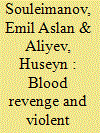

|
|
|
|
|
| Summary/Abstract |
Despite a considerable amount of ethnographic research into the phenomena of blood revenge and blood feud, little is known about the role of blood revenge in political violence, armed conflict, and irregular war. Yet blood revenge—widespread among many conflict-affected societies of the Middle East, North Africa, and beyond—is not confined to the realm of communal infighting, as previous research has presumed. An empirical analysis of Russia's two counterinsurgency campaigns in Chechnya suggests that the practice of blood revenge has functioned as an important mechanism in encouraging violent mobilization in the local population against the Russian troops and their Chechen proxies. The need to exact blood revenge has taken precedence over an individual's political views, or lack thereof. Triggered by the loss of a relative or humiliation, many apolitical Chechens who initially sought to avoid involvement in the hostilities or who had been skeptical of the insurgency mobilized to exact blood revenge to restore their individual and clan honor. Blood revenge functions as an effective, yet heavily underexplored, grievance-based mechanism encouraging violent mobilization in irregular wars.
|
|
|
|
|
|
|
|
|
|
|
|
|
|
|
|
| 2 |
ID:
192017


|
|
|
|
|
| Summary/Abstract |
As an embedded sociocultural code, blood revenge is present in many societies where civil wars occur. Whereas evidence from other social sciences attests to its enduring global significance, security studies scholarship has largely neglected the custom of blood revenge. This article is the first to investigate its relevance for understanding the inception, dynamics, and aftermath of armed conflicts, and to present a comprehensive account of how blood revenge may shape civil wars. Drawing upon multidisciplinary scholarship, cross-case qualitative evidence, and a newly compiled dataset, this proof-of-concept article illustrates how blood revenge influences key dynamics in civil wars—specifically, the processes of violent mobilization, target selection, recruitment, defection, and disengagement. Setting the stage for further inquiries into the causes, mechanisms, and consequences of blood revenge in civil war, this conceptual article suggests why and how this sociocultural code continues to influence civil wars across the world.
|
|
|
|
|
|
|
|
|
|
|
|
|
|
|
|
| 3 |
ID:
163191
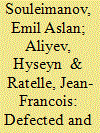

|
|
|
|
|
| Summary/Abstract |
Can former insurgents in the service of counterinsurgent paramilitaries be considered a perfectly loyal force? What mechanisms may help to deter subsequent defections of individuals who have already “betrayed” once? Drawing on a unique set of primary data, this article examines the effective counter-defection practices of Chechnya’s pro-Moscow paramilitaries toward prospective defectors from among ex-insurgents. It explores three interwoven mechanisms employed with various intensities to avert “double defections” at the peak of the locally fought counterinsurgency in Chechnya from 2000 to 2005. These mechanisms are: a) extrajudicial executions of recidivists and their relatives, b) initiation violence targeting insurgents’ relatives, and c) disclosure of the identities of defected insurgents who were responsible for killing insurgents in combat to the families of slain insurgents.
|
|
|
|
|
|
|
|
|
|
|
|
|
|
|
|
| 4 |
ID:
144773
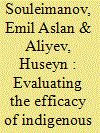

|
|
|
|
|
| Summary/Abstract |
This study seeks to identify factors conducive to the (in)efficacy of indigenous forces (IF) in counterinsurgency (COIN) operations in Russia’s republics of Chechnya and Dagestan. Empirically, it is the first study to offer an examination of the deployment of IF in the North Caucasus-based COIN. The findings of this article emphasize that the effectiveness of COIN in Chechnya, unlike Dagestan, is conditioned by a number of factors pertaining to the structural and organizational characteristics of IF. Of these, the IF’s experience as former insurgents, their access to insider information, and their loyalty to incumbents – often maintained by the threat of collective punishment – have proven decisive for a relatively successful COIN in Chechnya.
|
|
|
|
|
|
|
|
|
|
|
|
|
|
|
|
| 5 |
ID:
153494


|
|
|
|
|
| Summary/Abstract |
This is the first article to systematically examine the factors that have led to the considerable weakening of the North Caucasus insurgency since 2013: the selective targeting of the insurgents’ support base, the deployment of elite counter-insurgent force and army in special operations, the infiltration of insurgent groups and their decapitation, and the departure of the North Caucasians to the Syrian Civil War. Scrutinizing how these factors have reduced the regional insurgency, the article also points to their shortcomings that have, as the article shows, since 2014 contributed to an increase in insurgency-related violence in the region. First, the risk of severe penalization notwithstanding, many locals, driven by the locally embedded codes of retaliation and hospitality, as well as by the sympathies toward the insurgents, have continued to provide support to the insurgents and to put up resistance to the incumbent forces. Second, with elite counter-insurgent force limited in numbers and increasingly deployed outside of Russia, a considerable part of counter-insurgency operations has again been conducted by local police, infamous for incompetence and corruption. Third, while decapitation has failed to put an end to insurgent groups, these groups’ infiltration has become harder than previously due to the insurgent groups’ increasingly selective recruitment policies. Fourth, the falling numbers of North Caucasian volunteers to the Syrian Civil War has provided more recruits to the jihadist groups operating in their home region. The article concludes that the North Caucasus insurgency is likely to survive in the years to come.
|
|
|
|
|
|
|
|
|
|
|
|
|
|
|
|
| 6 |
ID:
163166
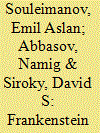

|
|
|
|
|
| Summary/Abstract |
Many scholars have suggested that organized violence in Chechnya has ended, and that Russia’s Chechenization policy and Ramzan Kadyrov’s presidency deserve the credit. We suggest that Putin has created a Frankenstein-like ruler over whom he risks losing control. As a result, the conflict only appears resolved, and we draw attention to both vertical and horizontal cracks in the foundation of Kadyrov’s rule that could lead to renewed violence. Vertically, the Chechen strongman and his growing clout in regional and federal politics have antagonized Russian siloviki. Horizontally, thousands of Chechens appear to be in a state of postponed blood feud toward Kadyrov, his clan, and the kadyrovtsy, his personal army. Backed by President Putin’s personal support, Kadyrov has put in motion a brutal machine of persecution over which some signs indicate he has lost control. Fear of extermination at the hands of the Kadyrov and his personal army has kept most prospective avengers at a bay. Once President Putin’s support wanes, locals will retaliate against Kadyrov and against Russian troops stationed in the republic, and Russian law enforcement circles will openly challenge Kadyrov’s rule. Putin’s support is only likely to wither if the costs of continued support (which grow with Kadyrov’s increasing independence) exceed the benefits (derived from an enforced peace). Either a renewed insurgency or ever more recalcitrant behavior would demonstrate a level of interest misalignment that could induce Putin to withdraw his support. Such a turn of events would render these horizontal and vertical cracks in the foundation of Kadyrov’s rule more noticeable and would likely to cause the frozen conflict in Chechnya to thaw, leading to a new civil war.
|
|
|
|
|
|
|
|
|
|
|
|
|
|
|
|
| 7 |
ID:
174108
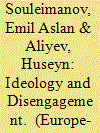

|
|
|
|
|
| Summary/Abstract |
Disengagement from militant groups has often been explained in individual terms such as battle fatigue or the desire to rejoin family and friends. We seek to examine empirically which other factors, beyond individual-level determinants, have influenced disengagement processes among militants belonging to different types of Chechen militant organisations. Drawing empirical insights from unique in-depth interviews with former members of the Chechen insurgency, their relatives, eyewitnesses to the Chechen wars and experts with first-hand knowledge of the researched phenomena, this study examines disengagement among jihadist and nationalist Chechen militants. Focusing on group-level factors, such as the capacity to resist external pressures, the use of violence, in-group social bonds and group cohesion, this article demonstrates that disengagement has been a less viable course of action for Chechen jihadists than for nationalist militants.
|
|
|
|
|
|
|
|
|
|
|
|
|
|
|
|
| 8 |
ID:
186040


|
|
|
|
|
| Summary/Abstract |
Drawing on original interviews with ex-insurgents and eyewitnesses of the Second Chechen War (1999–2009), this article develops a theory of “kin killing,” defined as the use of lethal violence against insurgents’ relatives as a deliberate counterinsurgency tactic. Family-based targeting works by coercing insurgents to surrender or defect, deterring insurgents’ relatives from retaliation, and discouraging prospective recruits from joining or supporting insurgents. Because it targets a small number of individuals who have strong ties to insurgents, kin killing is the most selective form of collective violence. The tactic is most likely to be used by illiberal regimes that know the identity of the insurgents, but not their location, and operate in traditional societies with large, tightly knit families. Most would consider kin killing—and its nonlethal counterpart, kin targeting—ethically reprehensible, but numerous countries have employed it with varying degrees of success, including Russia, the United Kingdom, and China. Militarily dominant regimes who employ kin killing can turn family members from force multipliers into pressure points for insurgents, as regimes “flip the network” and make restraint, rather than revenge, the best way to protect one’s family.
|
|
|
|
|
|
|
|
|
|
|
|
|
|
|
|
| 9 |
ID:
159380


|
|
|
|
|
| Summary/Abstract |
While terrorist and insurgent groups have often combined anti-state subversion with ‘purely‘ criminal activities in order to obtain the financial means to wage their ideological struggle, little is known about the transformation of such groups into non-ideological organised crime groups (OCG) with close links to authorities. This holds particularly for jihadist groups that have on ideological grounds ruled out collaboration with their archenemies – ‘infidels’ and ‘apostates’. Using unique ethnographic data from Russia’s Dagestan, this article explores the causes and contexts of the gradual transformation of some of Dagestan’s jihadist units – jamaats – into organised crime groups collaborating with local authorities.
|
|
|
|
|
|
|
|
|
|
|
|
|
|
|
|
| 10 |
ID:
145575


|
|
|
| 11 |
ID:
148396


|
|
|
|
|
| Summary/Abstract |
This article assesses the successes and setbacks of Moscow’s policy of counterinsurgency and beyond. It challenges the general consensus in scholarship positing that military successes associated with Chechenisation have been obtained against the backdrop of Chechnya’s increasingly autonomous status within Russia, considered by some as a case of ‘systemic separatism’. The article tracks how four key mechanisms (Chechnya’s institutional design, internal opposition to the Kadyrov clan, the tradition of blood feud among kadyrovtsy—initially Chechen paramilitary forces named after both Kadyrovs, gradually transformed into seemingly regular Ministry of Interior (MVD) units—and Chechnya’s economic dependency on Moscow) have enabled Moscow to maintain control over Chechnya while simultaneously allowing its elites to consolidate power within the republic.
|
|
|
|
|
|
|
|
|
|
|
|
|
|
|
|
| 12 |
ID:
149519
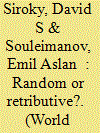

|
|
|
|
|
| Summary/Abstract |
This article provides a critical examination of the current theoretical debate concerning the effects of indiscriminate violence. It argues that indiscriminate violence has been treated as an essentially random counterinsurgency tactic, but that the important distinction between its random and retributive variations has been overlooked, along with critical issues of timing and location, which has made it difficult to evaluate its efficacy in quelling rebel violence. Prior research has shown that both random and retributive violence reduced insurgent activity in the targeted locations and in the short term, but it does not necessarily follow that indiscriminate violence is effective. This article uses microlevel ethnographic evidence from Chechen villages during the period from 2001 to 2005 to show that indiscriminate violence deployed retributively against village communities generated insurgent activity in other areas because local avengers and rebels from the targeted populations sought to avoid further retributive violence against their village communities. Moreover, the insurgent activity occurred at least nine months after the initial act of retributive violence. Indiscriminate violence deployed randomly against village communities generated insurgent activity within the same targeted area, since the insurgents did not fear retributive violence in retaliation, and occurred with a delay of at least six months. As a result, the rebel reaction to indiscriminate violence is not observed immediately or, in the case of retributive violence, in the same location. This finding has crucial implications for evaluating the efficacy of indiscriminate violence in counterinsurgency operations, and underscores the importance of understanding how the social and political context can shape the way populations react to different forms of violence.
|
|
|
|
|
|
|
|
|
|
|
|
|
|
|
|
| 13 |
ID:
156894


|
|
|
|
|
| Summary/Abstract |
This article posits that the remnants of archaic sociocultural norms, particularly the honour-imposed custom of retaliation, play a crucial role in the process of insurgent engagement in Russia's autonomous republic of Dagestan. Through a series of interviews with former insurgents, this study outlines two retaliation-centred mechanisms: “individual retaliation” and “spiritual retaliation” in order to explain the microcosm of motives behind insurgent activity in Dagestan. In doing so, this study problematizes the role of Salafi/Jihadist ideology as the main impetus for insurgent violence. Reversing the traditional causal link between violence and religion, this study also demonstrates that the development of Jihadist ideology is a by-product of insurgent mobilization rather than its cause.
|
|
|
|
|
|
|
|
|
|
|
|
|
|
|
|
| 14 |
ID:
169595


|
|
|
|
|
| Summary/Abstract |
From the early 1970s until Muammar Qadhafi's toppling in 2011, Moscow and the Libyan Jamahiriya enjoyed cordial relations. During the Cold War, Libya played an important role as the forward base of Soviet interests in the Mediterranean. Although Moscow and Tripoli never entered into a formal alliance, Soviet military instructors were frequent guests in Libya, its military was equipped with Soviet weapons, and Qadhafi was supportive of Moscow's highly‐advertised efforts to back anti‐colonial and anti‐imperialist struggle around the globe. Even more important, both nations enjoyed substantial economic cooperation. The relationship became strained in 1992, however, as the government of the newly established Russian Federation joined the international sanctions regime against Libya. Yet, with the exception of this brief intermezzo, Qadhafi's friendly regime was perceived by Russia's foreign‐policy makers as an important asset in the Mediterranean.
|
|
|
|
|
|
|
|
|
|
|
|
|
|
|
|
| 15 |
ID:
142176


|
|
|
|
|
| Summary/Abstract |
The rise of the Islamic State in Syria and Iraq (ISIS, ISIL or IS) has once again brought the Middle East to the center of the international stage. This quasi-state's recent territorial gains, together with its harsh treatment of religious minorities, brazen media campaign and destruction of the region's unique cultural heritage, have all galvanized millions in the region and across the world against the group. The unprecedented number of youth from countries across the Muslim world as well as from Western diasporic communities volunteering to join ISIS has generated enormous security concerns for the governments of jihadists’ home countries. It is believed that the subsequent reemergence of a large and increasingly dedicated, experienced and unified transnational jihadist force poses a challenge not only to regional security in jihadists’ home countries, but also to key Western nations engaged in combatting the Islamic State and similar groups around the world.
|
|
|
|
|
|
|
|
|
|
|
|
|
|
|
|
| 16 |
ID:
154312
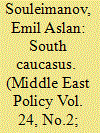

|
|
|
| 17 |
ID:
148257
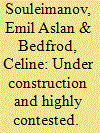

|
|
|
|
|
| Summary/Abstract |
While scholarship on Islam in the Caucasus has focused on the late Soviet religious revival – the rise of Salafi jihadism and religious radicalisation in the northern part of these strategic crossroads – no study to date has addressed the discursive struggle over the social functions of regional Islam. This article deconstructs these discourses in order to examine the very varying, and often conflicting, representations of Islam advocated by various actors across the region and within particular republics. The article highlights the contested functions of regional Islam against the background of a religious revival that is still a work in progress.
|
|
|
|
|
|
|
|
|
|
|
|
|
|
|
|
|
|
|
|
|